Childcare Report: Developing Secure Relationships and Attachment
VerifiedAdded on 2020/06/06
|8
|1772
|99
Report
AI Summary
This report delves into the complexities of childcare, emphasizing the crucial role of secure relationships and attachment in fostering a child's emotional well-being and overall development. It explores the processes involved in establishing these vital connections, highlighting the importance of caregiver responsiveness, communication, and a stable environment. The report examines the stages of attachment, factors affecting it, and the impact of postnatal depression. Furthermore, it outlines the responsibilities of key personnel, including school teachers, care providers, and parents, within the framework of the Early Years Foundation Stage (EYFS) in the UK. The report concludes by assessing the positive impact of secure relationships on a child's communication skills, trust, social and emotional development, and collaborative learning, ultimately underlining the significance of these relationships for a child's healthy growth and future well-being. References to supporting literature are also included.
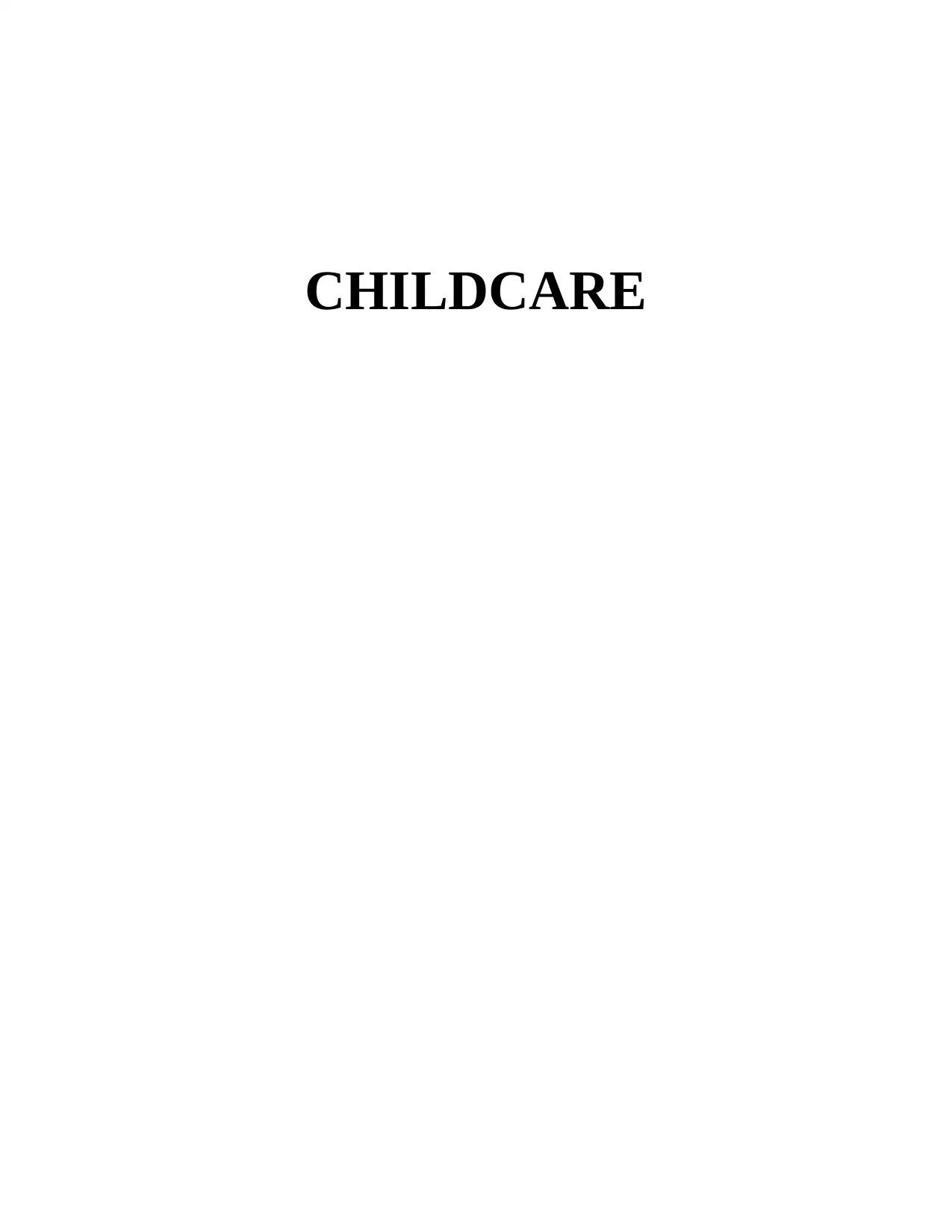
CHILDCARE
Paraphrase This Document
Need a fresh take? Get an instant paraphrase of this document with our AI Paraphraser
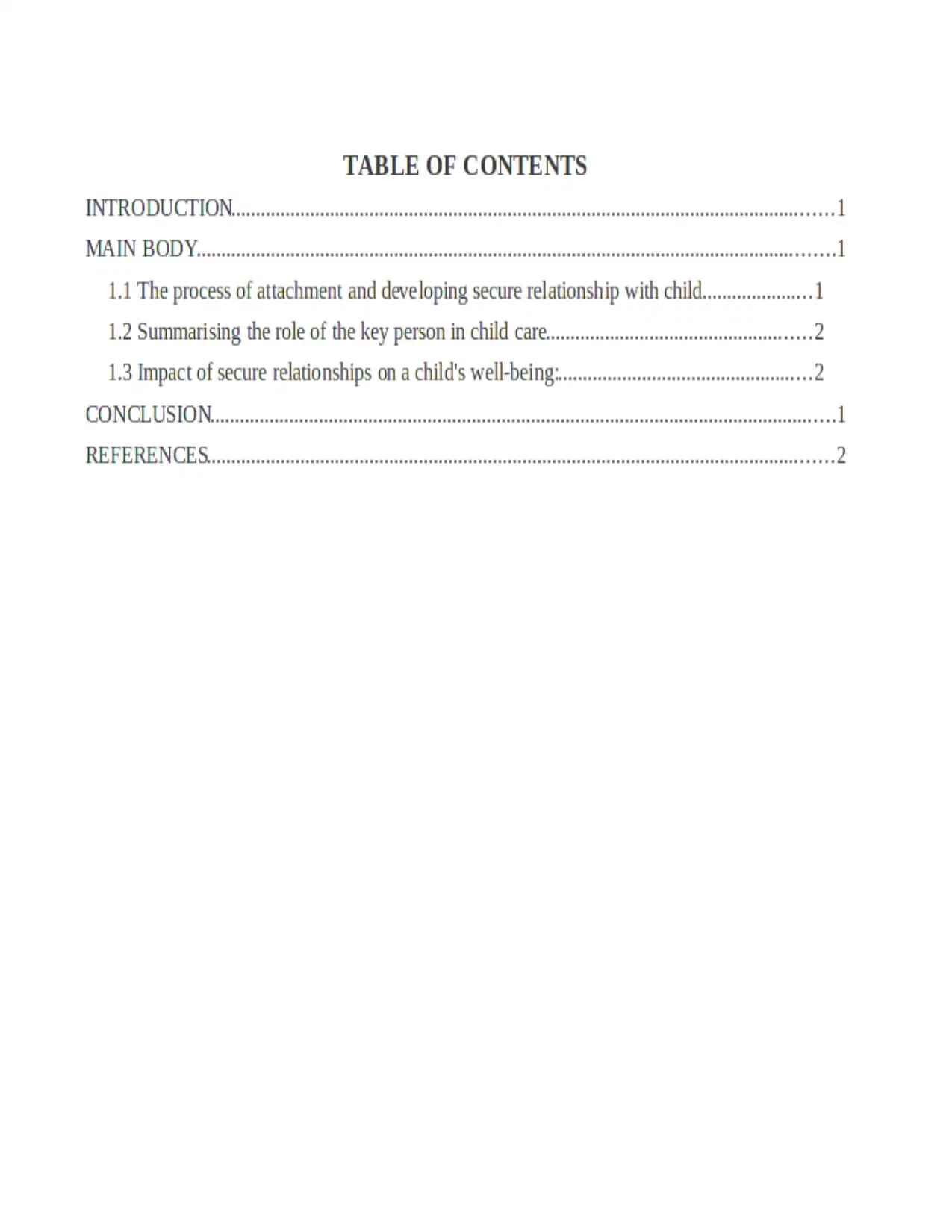
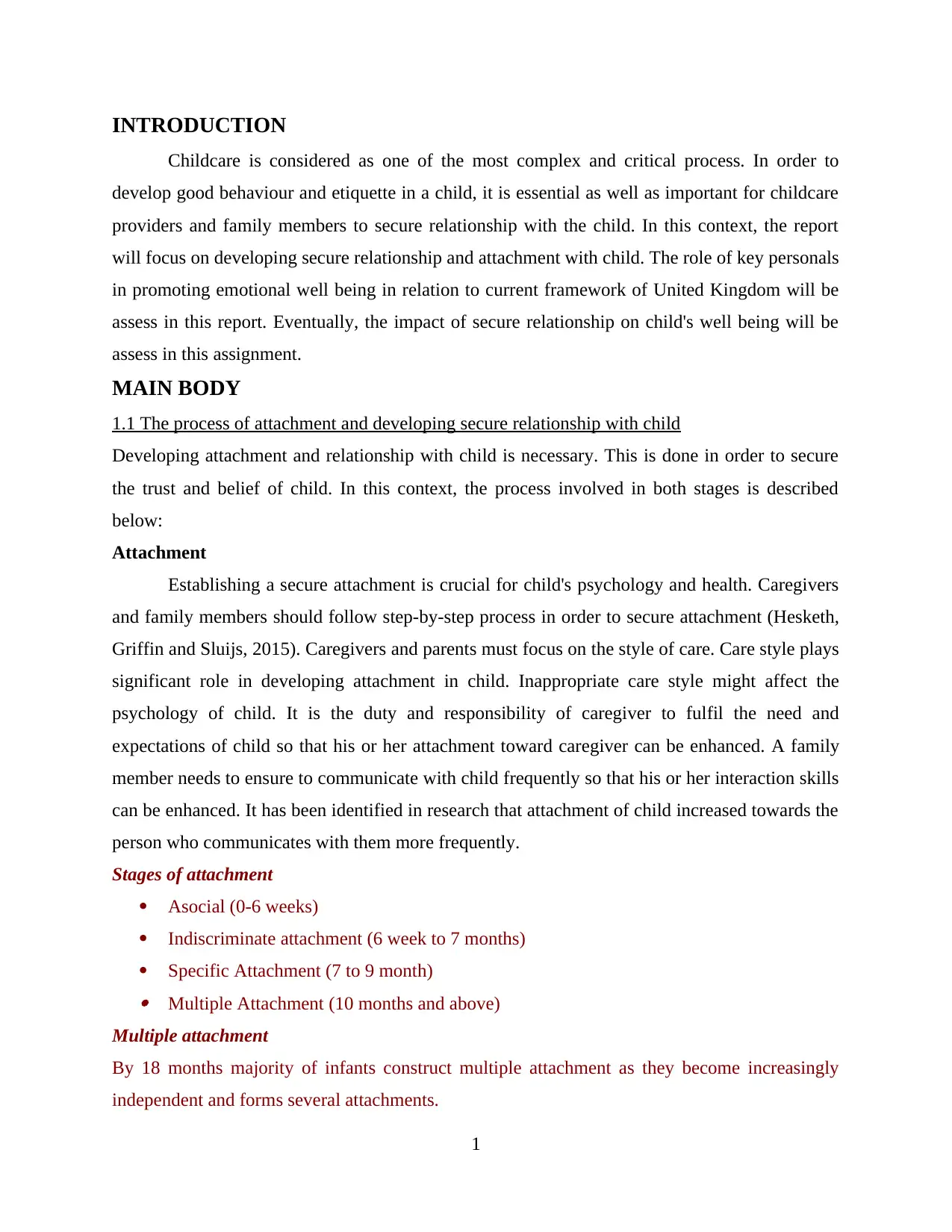
INTRODUCTION
Childcare is considered as one of the most complex and critical process. In order to
develop good behaviour and etiquette in a child, it is essential as well as important for childcare
providers and family members to secure relationship with the child. In this context, the report
will focus on developing secure relationship and attachment with child. The role of key personals
in promoting emotional well being in relation to current framework of United Kingdom will be
assess in this report. Eventually, the impact of secure relationship on child's well being will be
assess in this assignment.
MAIN BODY
1.1 The process of attachment and developing secure relationship with child
Developing attachment and relationship with child is necessary. This is done in order to secure
the trust and belief of child. In this context, the process involved in both stages is described
below:
Attachment
Establishing a secure attachment is crucial for child's psychology and health. Caregivers
and family members should follow step-by-step process in order to secure attachment (Hesketh,
Griffin and Sluijs, 2015). Caregivers and parents must focus on the style of care. Care style plays
significant role in developing attachment in child. Inappropriate care style might affect the
psychology of child. It is the duty and responsibility of caregiver to fulfil the need and
expectations of child so that his or her attachment toward caregiver can be enhanced. A family
member needs to ensure to communicate with child frequently so that his or her interaction skills
can be enhanced. It has been identified in research that attachment of child increased towards the
person who communicates with them more frequently.
Stages of attachment
Asocial (0-6 weeks)
Indiscriminate attachment (6 week to 7 months)
Specific Attachment (7 to 9 month) Multiple Attachment (10 months and above)
Multiple attachment
By 18 months majority of infants construct multiple attachment as they become increasingly
independent and forms several attachments.
1
Childcare is considered as one of the most complex and critical process. In order to
develop good behaviour and etiquette in a child, it is essential as well as important for childcare
providers and family members to secure relationship with the child. In this context, the report
will focus on developing secure relationship and attachment with child. The role of key personals
in promoting emotional well being in relation to current framework of United Kingdom will be
assess in this report. Eventually, the impact of secure relationship on child's well being will be
assess in this assignment.
MAIN BODY
1.1 The process of attachment and developing secure relationship with child
Developing attachment and relationship with child is necessary. This is done in order to secure
the trust and belief of child. In this context, the process involved in both stages is described
below:
Attachment
Establishing a secure attachment is crucial for child's psychology and health. Caregivers
and family members should follow step-by-step process in order to secure attachment (Hesketh,
Griffin and Sluijs, 2015). Caregivers and parents must focus on the style of care. Care style plays
significant role in developing attachment in child. Inappropriate care style might affect the
psychology of child. It is the duty and responsibility of caregiver to fulfil the need and
expectations of child so that his or her attachment toward caregiver can be enhanced. A family
member needs to ensure to communicate with child frequently so that his or her interaction skills
can be enhanced. It has been identified in research that attachment of child increased towards the
person who communicates with them more frequently.
Stages of attachment
Asocial (0-6 weeks)
Indiscriminate attachment (6 week to 7 months)
Specific Attachment (7 to 9 month) Multiple Attachment (10 months and above)
Multiple attachment
By 18 months majority of infants construct multiple attachment as they become increasingly
independent and forms several attachments.
1
⊘ This is a preview!⊘
Do you want full access?
Subscribe today to unlock all pages.

Trusted by 1+ million students worldwide
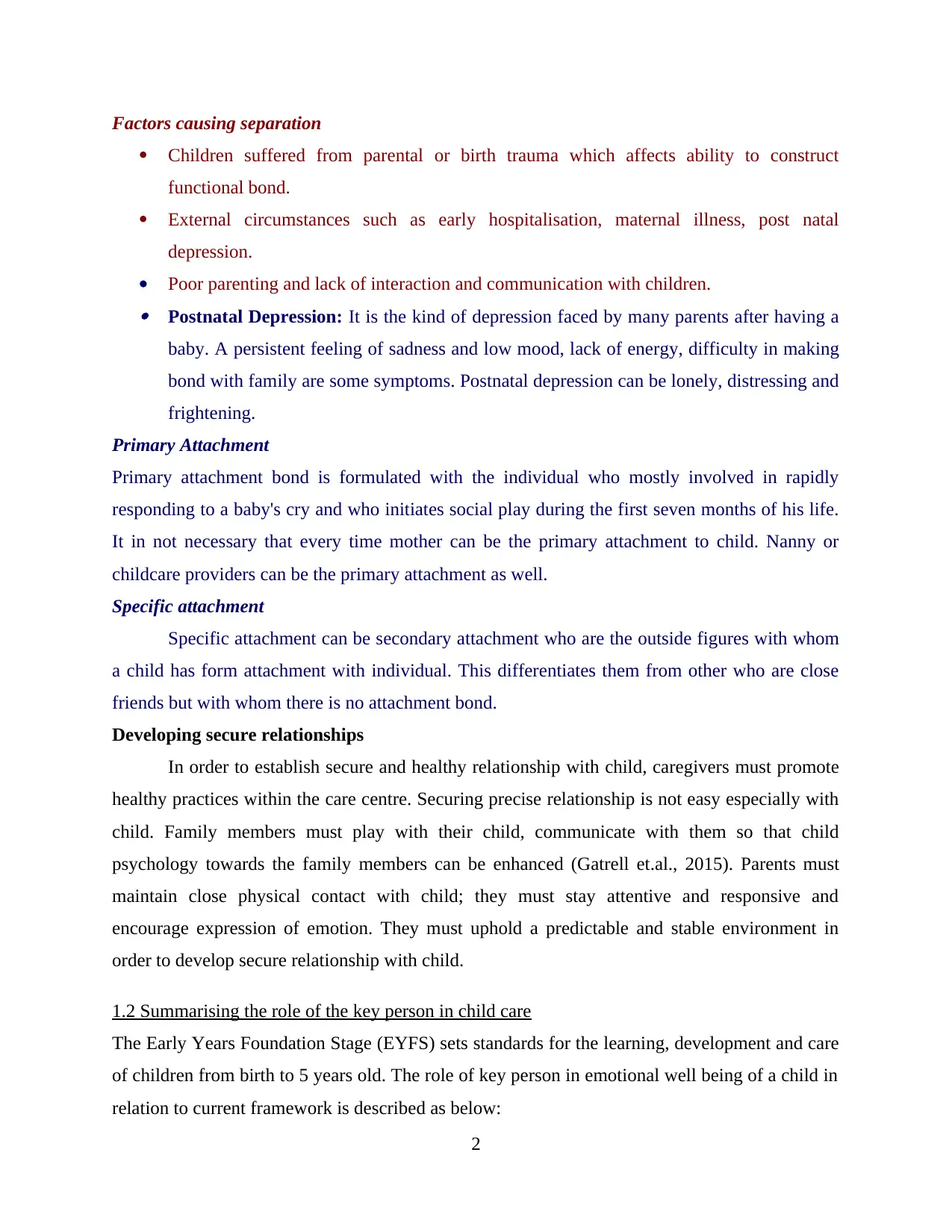
Factors causing separation
Children suffered from parental or birth trauma which affects ability to construct
functional bond.
External circumstances such as early hospitalisation, maternal illness, post natal
depression.
Poor parenting and lack of interaction and communication with children. Postnatal Depression: It is the kind of depression faced by many parents after having a
baby. A persistent feeling of sadness and low mood, lack of energy, difficulty in making
bond with family are some symptoms. Postnatal depression can be lonely, distressing and
frightening.
Primary Attachment
Primary attachment bond is formulated with the individual who mostly involved in rapidly
responding to a baby's cry and who initiates social play during the first seven months of his life.
It in not necessary that every time mother can be the primary attachment to child. Nanny or
childcare providers can be the primary attachment as well.
Specific attachment
Specific attachment can be secondary attachment who are the outside figures with whom
a child has form attachment with individual. This differentiates them from other who are close
friends but with whom there is no attachment bond.
Developing secure relationships
In order to establish secure and healthy relationship with child, caregivers must promote
healthy practices within the care centre. Securing precise relationship is not easy especially with
child. Family members must play with their child, communicate with them so that child
psychology towards the family members can be enhanced (Gatrell et.al., 2015). Parents must
maintain close physical contact with child; they must stay attentive and responsive and
encourage expression of emotion. They must uphold a predictable and stable environment in
order to develop secure relationship with child.
1.2 Summarising the role of the key person in child care
The Early Years Foundation Stage (EYFS) sets standards for the learning, development and care
of children from birth to 5 years old. The role of key person in emotional well being of a child in
relation to current framework is described as below:
2
Children suffered from parental or birth trauma which affects ability to construct
functional bond.
External circumstances such as early hospitalisation, maternal illness, post natal
depression.
Poor parenting and lack of interaction and communication with children. Postnatal Depression: It is the kind of depression faced by many parents after having a
baby. A persistent feeling of sadness and low mood, lack of energy, difficulty in making
bond with family are some symptoms. Postnatal depression can be lonely, distressing and
frightening.
Primary Attachment
Primary attachment bond is formulated with the individual who mostly involved in rapidly
responding to a baby's cry and who initiates social play during the first seven months of his life.
It in not necessary that every time mother can be the primary attachment to child. Nanny or
childcare providers can be the primary attachment as well.
Specific attachment
Specific attachment can be secondary attachment who are the outside figures with whom
a child has form attachment with individual. This differentiates them from other who are close
friends but with whom there is no attachment bond.
Developing secure relationships
In order to establish secure and healthy relationship with child, caregivers must promote
healthy practices within the care centre. Securing precise relationship is not easy especially with
child. Family members must play with their child, communicate with them so that child
psychology towards the family members can be enhanced (Gatrell et.al., 2015). Parents must
maintain close physical contact with child; they must stay attentive and responsive and
encourage expression of emotion. They must uphold a predictable and stable environment in
order to develop secure relationship with child.
1.2 Summarising the role of the key person in child care
The Early Years Foundation Stage (EYFS) sets standards for the learning, development and care
of children from birth to 5 years old. The role of key person in emotional well being of a child in
relation to current framework is described as below:
2
Paraphrase This Document
Need a fresh take? Get an instant paraphrase of this document with our AI Paraphraser
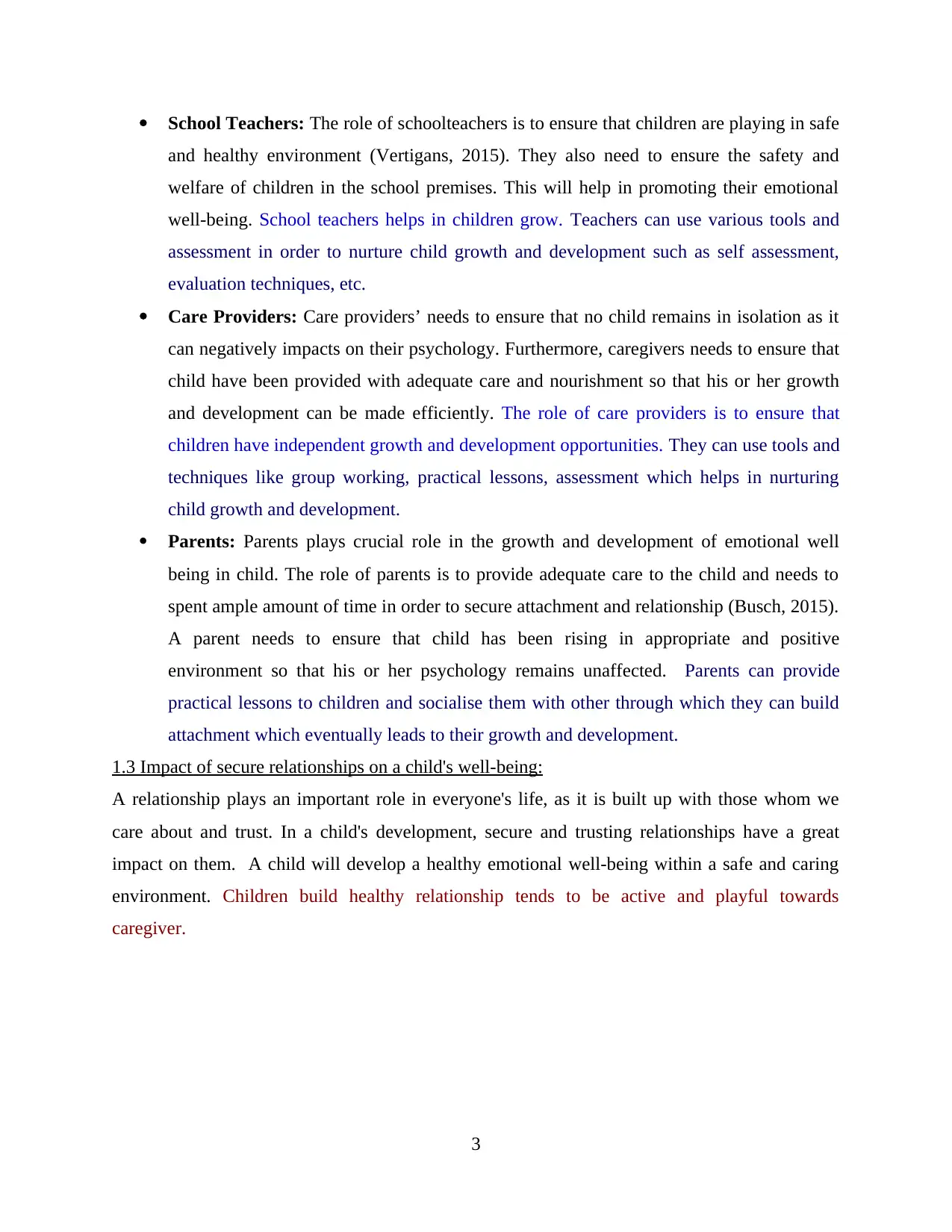
School Teachers: The role of schoolteachers is to ensure that children are playing in safe
and healthy environment (Vertigans, 2015). They also need to ensure the safety and
welfare of children in the school premises. This will help in promoting their emotional
well-being. School teachers helps in children grow. Teachers can use various tools and
assessment in order to nurture child growth and development such as self assessment,
evaluation techniques, etc.
Care Providers: Care providers’ needs to ensure that no child remains in isolation as it
can negatively impacts on their psychology. Furthermore, caregivers needs to ensure that
child have been provided with adequate care and nourishment so that his or her growth
and development can be made efficiently. The role of care providers is to ensure that
children have independent growth and development opportunities. They can use tools and
techniques like group working, practical lessons, assessment which helps in nurturing
child growth and development.
Parents: Parents plays crucial role in the growth and development of emotional well
being in child. The role of parents is to provide adequate care to the child and needs to
spent ample amount of time in order to secure attachment and relationship (Busch, 2015).
A parent needs to ensure that child has been rising in appropriate and positive
environment so that his or her psychology remains unaffected. Parents can provide
practical lessons to children and socialise them with other through which they can build
attachment which eventually leads to their growth and development.
1.3 Impact of secure relationships on a child's well-being:
A relationship plays an important role in everyone's life, as it is built up with those whom we
care about and trust. In a child's development, secure and trusting relationships have a great
impact on them. A child will develop a healthy emotional well-being within a safe and caring
environment. Children build healthy relationship tends to be active and playful towards
caregiver.
3
and healthy environment (Vertigans, 2015). They also need to ensure the safety and
welfare of children in the school premises. This will help in promoting their emotional
well-being. School teachers helps in children grow. Teachers can use various tools and
assessment in order to nurture child growth and development such as self assessment,
evaluation techniques, etc.
Care Providers: Care providers’ needs to ensure that no child remains in isolation as it
can negatively impacts on their psychology. Furthermore, caregivers needs to ensure that
child have been provided with adequate care and nourishment so that his or her growth
and development can be made efficiently. The role of care providers is to ensure that
children have independent growth and development opportunities. They can use tools and
techniques like group working, practical lessons, assessment which helps in nurturing
child growth and development.
Parents: Parents plays crucial role in the growth and development of emotional well
being in child. The role of parents is to provide adequate care to the child and needs to
spent ample amount of time in order to secure attachment and relationship (Busch, 2015).
A parent needs to ensure that child has been rising in appropriate and positive
environment so that his or her psychology remains unaffected. Parents can provide
practical lessons to children and socialise them with other through which they can build
attachment which eventually leads to their growth and development.
1.3 Impact of secure relationships on a child's well-being:
A relationship plays an important role in everyone's life, as it is built up with those whom we
care about and trust. In a child's development, secure and trusting relationships have a great
impact on them. A child will develop a healthy emotional well-being within a safe and caring
environment. Children build healthy relationship tends to be active and playful towards
caregiver.
3
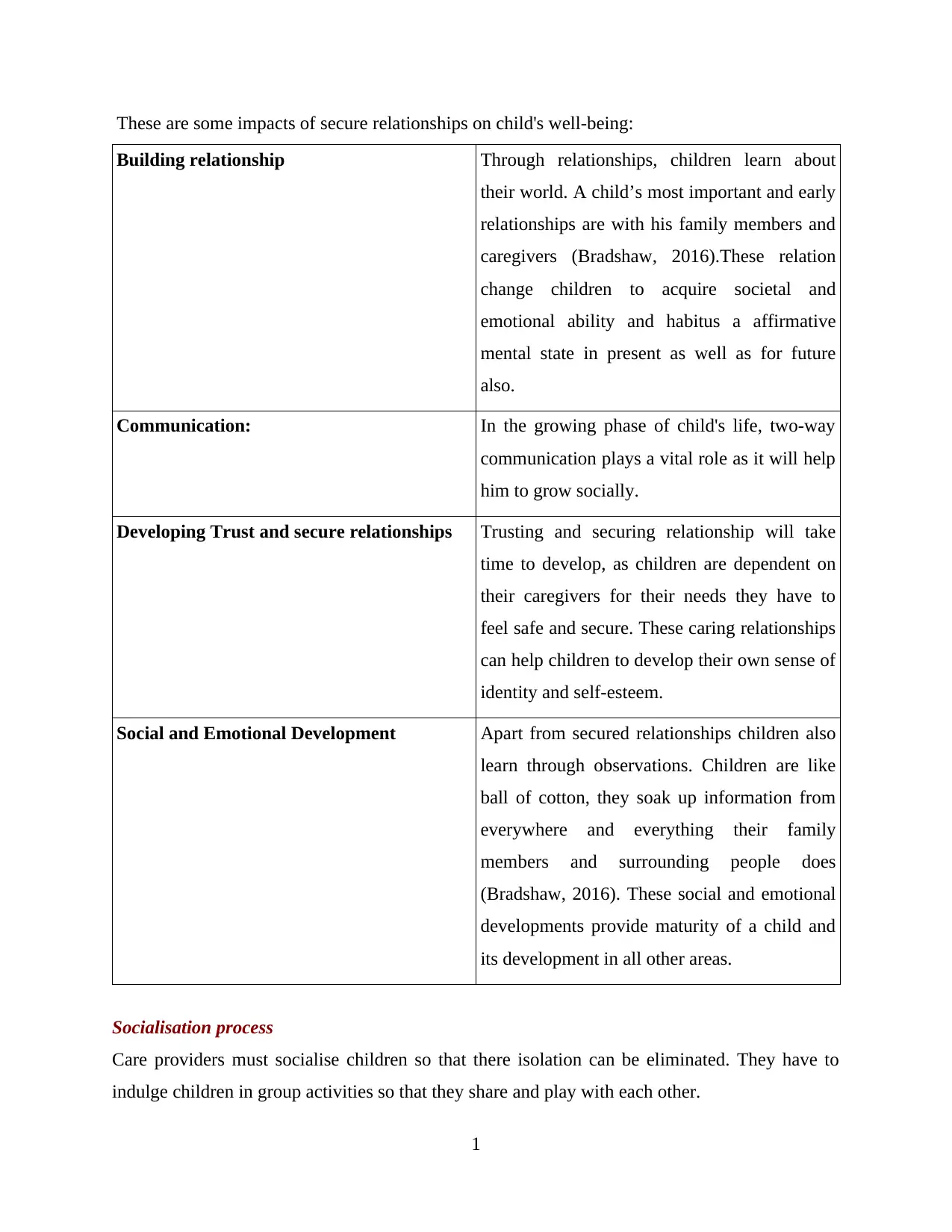
These are some impacts of secure relationships on child's well-being:
Building relationship Through relationships, children learn about
their world. A child’s most important and early
relationships are with his family members and
caregivers (Bradshaw, 2016).These relation
change children to acquire societal and
emotional ability and habitus a affirmative
mental state in present as well as for future
also.
Communication: In the growing phase of child's life, two-way
communication plays a vital role as it will help
him to grow socially.
Developing Trust and secure relationships Trusting and securing relationship will take
time to develop, as children are dependent on
their caregivers for their needs they have to
feel safe and secure. These caring relationships
can help children to develop their own sense of
identity and self-esteem.
Social and Emotional Development Apart from secured relationships children also
learn through observations. Children are like
ball of cotton, they soak up information from
everywhere and everything their family
members and surrounding people does
(Bradshaw, 2016). These social and emotional
developments provide maturity of a child and
its development in all other areas.
Socialisation process
Care providers must socialise children so that there isolation can be eliminated. They have to
indulge children in group activities so that they share and play with each other.
1
Building relationship Through relationships, children learn about
their world. A child’s most important and early
relationships are with his family members and
caregivers (Bradshaw, 2016).These relation
change children to acquire societal and
emotional ability and habitus a affirmative
mental state in present as well as for future
also.
Communication: In the growing phase of child's life, two-way
communication plays a vital role as it will help
him to grow socially.
Developing Trust and secure relationships Trusting and securing relationship will take
time to develop, as children are dependent on
their caregivers for their needs they have to
feel safe and secure. These caring relationships
can help children to develop their own sense of
identity and self-esteem.
Social and Emotional Development Apart from secured relationships children also
learn through observations. Children are like
ball of cotton, they soak up information from
everywhere and everything their family
members and surrounding people does
(Bradshaw, 2016). These social and emotional
developments provide maturity of a child and
its development in all other areas.
Socialisation process
Care providers must socialise children so that there isolation can be eliminated. They have to
indulge children in group activities so that they share and play with each other.
1
⊘ This is a preview!⊘
Do you want full access?
Subscribe today to unlock all pages.

Trusted by 1+ million students worldwide
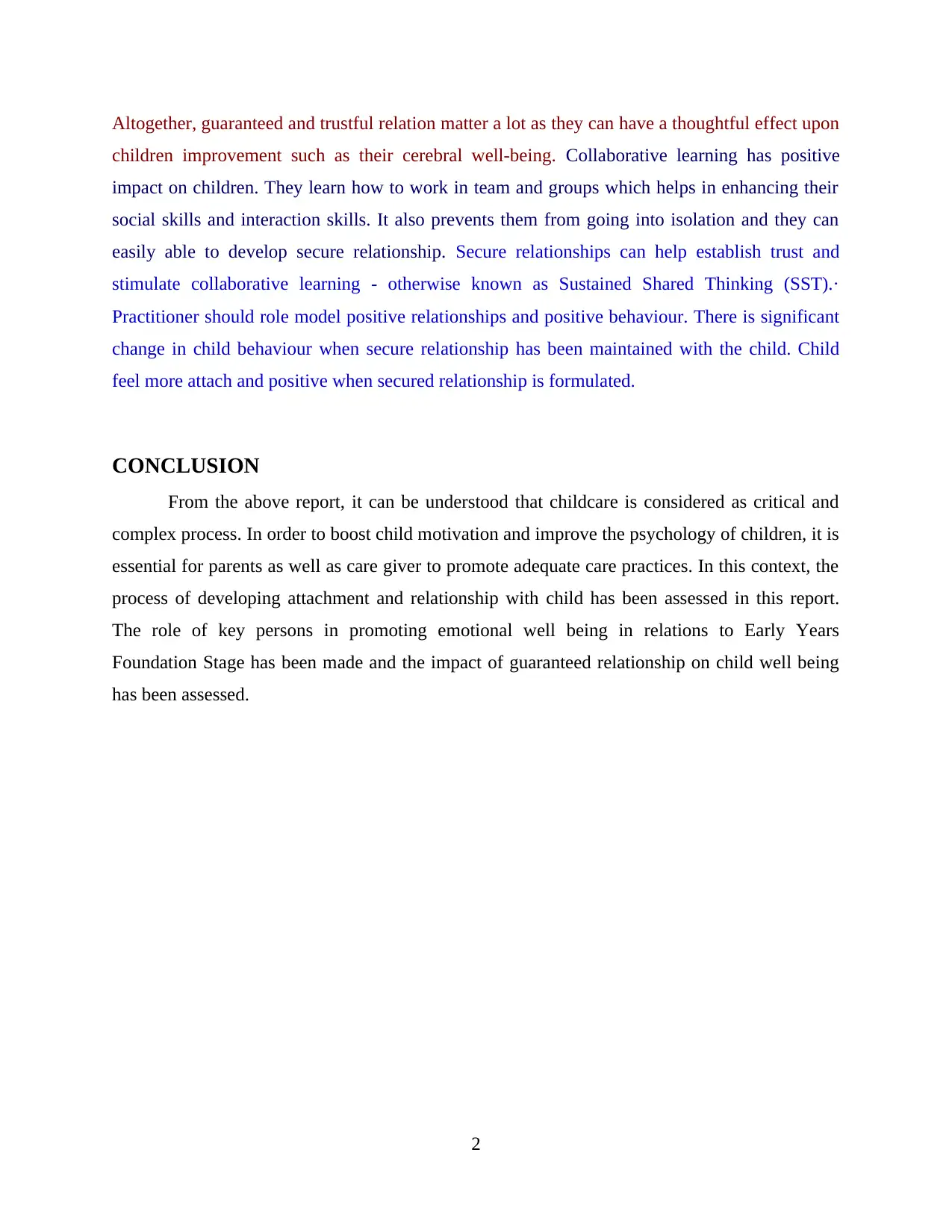
Altogether, guaranteed and trustful relation matter a lot as they can have a thoughtful effect upon
children improvement such as their cerebral well-being. Collaborative learning has positive
impact on children. They learn how to work in team and groups which helps in enhancing their
social skills and interaction skills. It also prevents them from going into isolation and they can
easily able to develop secure relationship. Secure relationships can help establish trust and
stimulate collaborative learning - otherwise known as Sustained Shared Thinking (SST).·
Practitioner should role model positive relationships and positive behaviour. There is significant
change in child behaviour when secure relationship has been maintained with the child. Child
feel more attach and positive when secured relationship is formulated.
CONCLUSION
From the above report, it can be understood that childcare is considered as critical and
complex process. In order to boost child motivation and improve the psychology of children, it is
essential for parents as well as care giver to promote adequate care practices. In this context, the
process of developing attachment and relationship with child has been assessed in this report.
The role of key persons in promoting emotional well being in relations to Early Years
Foundation Stage has been made and the impact of guaranteed relationship on child well being
has been assessed.
2
children improvement such as their cerebral well-being. Collaborative learning has positive
impact on children. They learn how to work in team and groups which helps in enhancing their
social skills and interaction skills. It also prevents them from going into isolation and they can
easily able to develop secure relationship. Secure relationships can help establish trust and
stimulate collaborative learning - otherwise known as Sustained Shared Thinking (SST).·
Practitioner should role model positive relationships and positive behaviour. There is significant
change in child behaviour when secure relationship has been maintained with the child. Child
feel more attach and positive when secured relationship is formulated.
CONCLUSION
From the above report, it can be understood that childcare is considered as critical and
complex process. In order to boost child motivation and improve the psychology of children, it is
essential for parents as well as care giver to promote adequate care practices. In this context, the
process of developing attachment and relationship with child has been assessed in this report.
The role of key persons in promoting emotional well being in relations to Early Years
Foundation Stage has been made and the impact of guaranteed relationship on child well being
has been assessed.
2
Paraphrase This Document
Need a fresh take? Get an instant paraphrase of this document with our AI Paraphraser
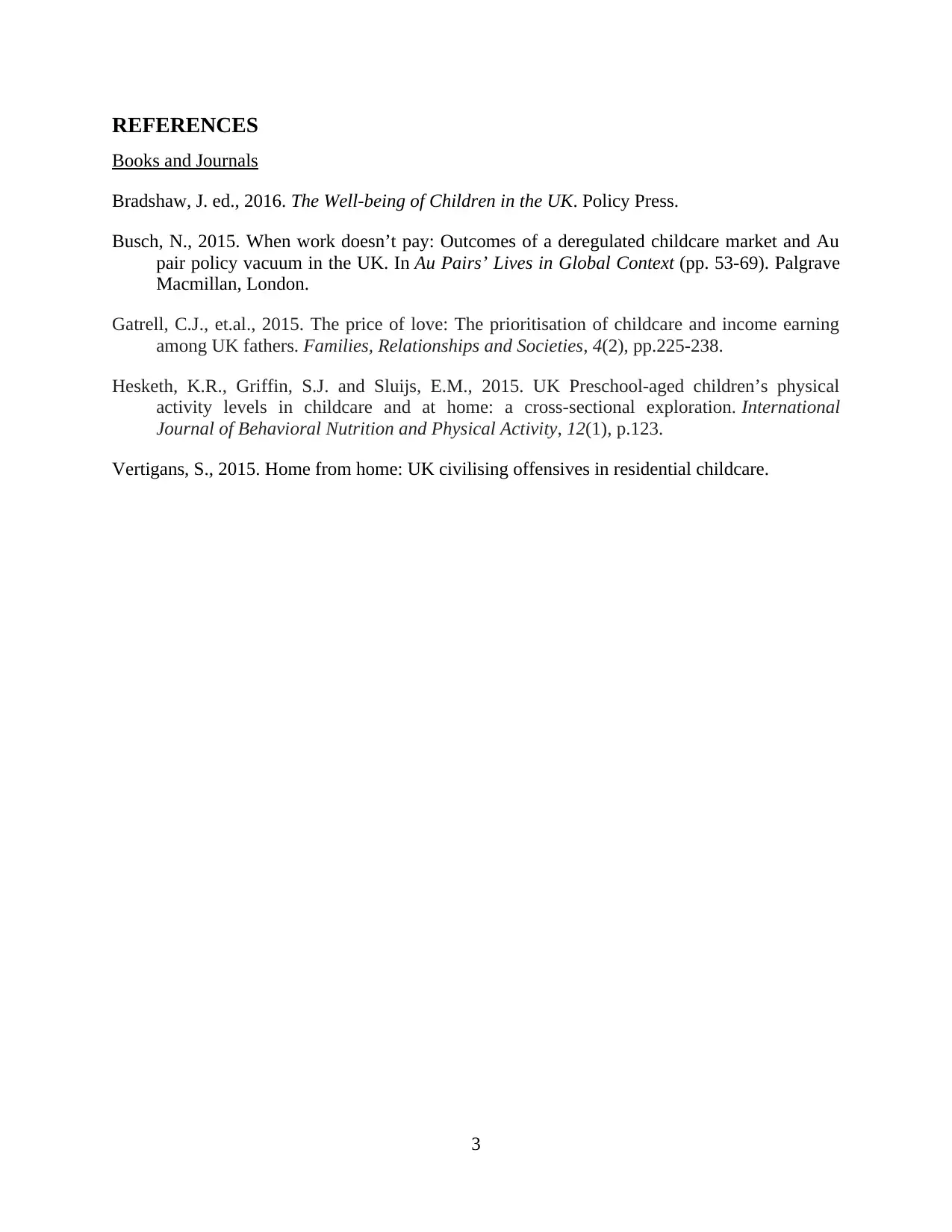
REFERENCES
Books and Journals
Bradshaw, J. ed., 2016. The Well-being of Children in the UK. Policy Press.
Busch, N., 2015. When work doesn’t pay: Outcomes of a deregulated childcare market and Au
pair policy vacuum in the UK. In Au Pairs’ Lives in Global Context (pp. 53-69). Palgrave
Macmillan, London.
Gatrell, C.J., et.al., 2015. The price of love: The prioritisation of childcare and income earning
among UK fathers. Families, Relationships and Societies, 4(2), pp.225-238.
Hesketh, K.R., Griffin, S.J. and Sluijs, E.M., 2015. UK Preschool-aged children’s physical
activity levels in childcare and at home: a cross-sectional exploration. International
Journal of Behavioral Nutrition and Physical Activity, 12(1), p.123.
Vertigans, S., 2015. Home from home: UK civilising offensives in residential childcare.
3
Books and Journals
Bradshaw, J. ed., 2016. The Well-being of Children in the UK. Policy Press.
Busch, N., 2015. When work doesn’t pay: Outcomes of a deregulated childcare market and Au
pair policy vacuum in the UK. In Au Pairs’ Lives in Global Context (pp. 53-69). Palgrave
Macmillan, London.
Gatrell, C.J., et.al., 2015. The price of love: The prioritisation of childcare and income earning
among UK fathers. Families, Relationships and Societies, 4(2), pp.225-238.
Hesketh, K.R., Griffin, S.J. and Sluijs, E.M., 2015. UK Preschool-aged children’s physical
activity levels in childcare and at home: a cross-sectional exploration. International
Journal of Behavioral Nutrition and Physical Activity, 12(1), p.123.
Vertigans, S., 2015. Home from home: UK civilising offensives in residential childcare.
3
1 out of 8
Related Documents
Your All-in-One AI-Powered Toolkit for Academic Success.
+13062052269
info@desklib.com
Available 24*7 on WhatsApp / Email
![[object Object]](/_next/static/media/star-bottom.7253800d.svg)
Unlock your academic potential
Copyright © 2020–2026 A2Z Services. All Rights Reserved. Developed and managed by ZUCOL.





